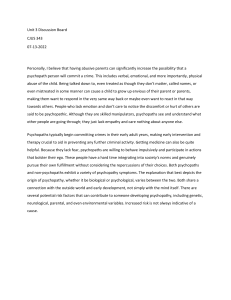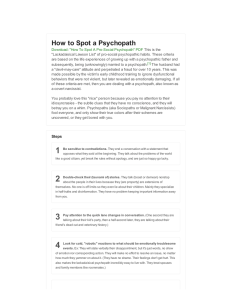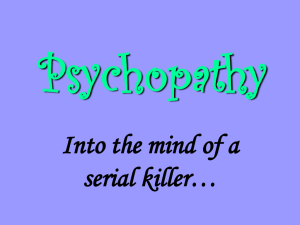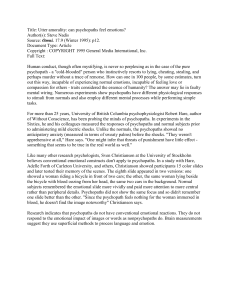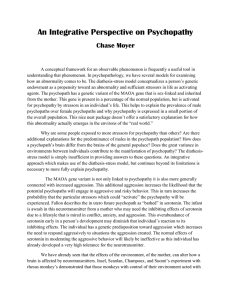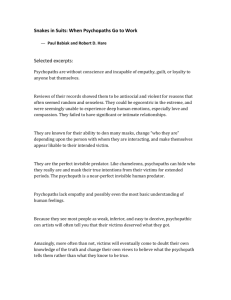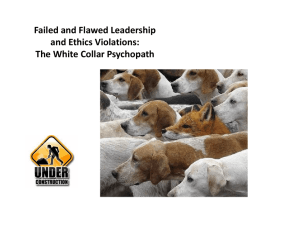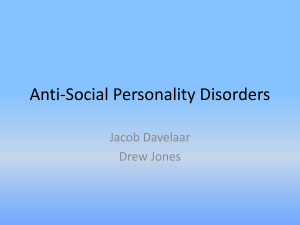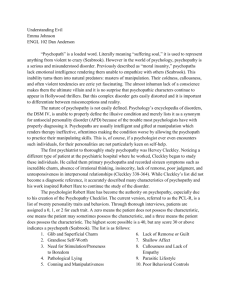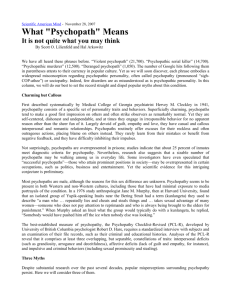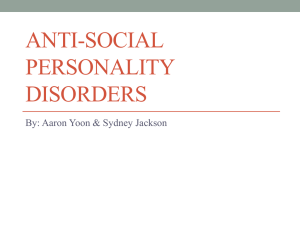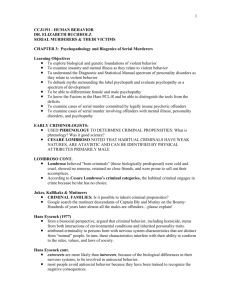Moral Responsibility and Psychopathy: Why We Do Not Have
advertisement
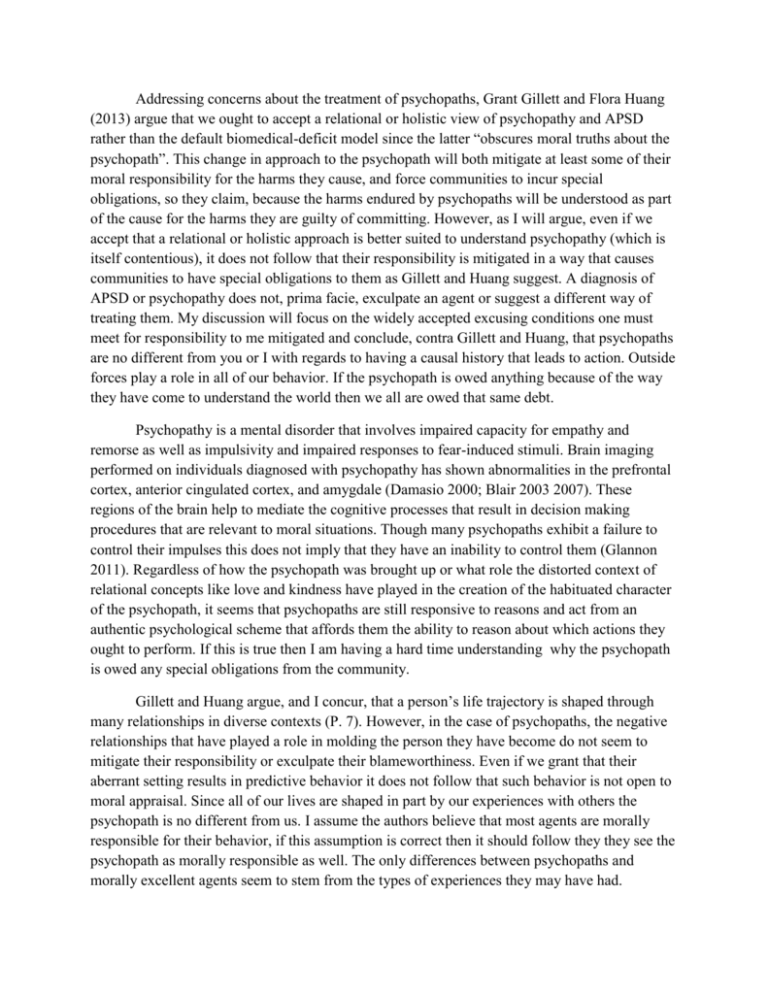
Addressing concerns about the treatment of psychopaths, Grant Gillett and Flora Huang (2013) argue that we ought to accept a relational or holistic view of psychopathy and APSD rather than the default biomedical-deficit model since the latter “obscures moral truths about the psychopath”. This change in approach to the psychopath will both mitigate at least some of their moral responsibility for the harms they cause, and force communities to incur special obligations, so they claim, because the harms endured by psychopaths will be understood as part of the cause for the harms they are guilty of committing. However, as I will argue, even if we accept that a relational or holistic approach is better suited to understand psychopathy (which is itself contentious), it does not follow that their responsibility is mitigated in a way that causes communities to have special obligations to them as Gillett and Huang suggest. A diagnosis of APSD or psychopathy does not, prima facie, exculpate an agent or suggest a different way of treating them. My discussion will focus on the widely accepted excusing conditions one must meet for responsibility to me mitigated and conclude, contra Gillett and Huang, that psychopaths are no different from you or I with regards to having a causal history that leads to action. Outside forces play a role in all of our behavior. If the psychopath is owed anything because of the way they have come to understand the world then we all are owed that same debt. Psychopathy is a mental disorder that involves impaired capacity for empathy and remorse as well as impulsivity and impaired responses to fear-induced stimuli. Brain imaging performed on individuals diagnosed with psychopathy has shown abnormalities in the prefrontal cortex, anterior cingulated cortex, and amygdale (Damasio 2000; Blair 2003 2007). These regions of the brain help to mediate the cognitive processes that result in decision making procedures that are relevant to moral situations. Though many psychopaths exhibit a failure to control their impulses this does not imply that they have an inability to control them (Glannon 2011). Regardless of how the psychopath was brought up or what role the distorted context of relational concepts like love and kindness have played in the creation of the habituated character of the psychopath, it seems that psychopaths are still responsive to reasons and act from an authentic psychological scheme that affords them the ability to reason about which actions they ought to perform. If this is true then I am having a hard time understanding why the psychopath is owed any special obligations from the community. Gillett and Huang argue, and I concur, that a person’s life trajectory is shaped through many relationships in diverse contexts (P. 7). However, in the case of psychopaths, the negative relationships that have played a role in molding the person they have become do not seem to mitigate their responsibility or exculpate their blameworthiness. Even if we grant that their aberrant setting results in predictive behavior it does not follow that such behavior is not open to moral appraisal. Since all of our lives are shaped in part by our experiences with others the psychopath is no different from us. I assume the authors believe that most agents are morally responsible for their behavior, if this assumption is correct then it should follow they they see the psychopath as morally responsible as well. The only differences between psychopaths and morally excellent agents seem to stem from the types of experiences they may have had. However, if those types of experiences determine psychopaths to act in the way that they do then it would seem that all who have gone through analogous experiences would exhibit similar behavior. This does not seem to hold. There are individuals that have gone through comparable upbringings that have not exhibited the sorts of behaviors that we see in psychopaths. This suggests either that the individual also plays a significant role in personal development or that personality is in fact intrinsic as some have suggested. One’s life history is pertinent to any discussion about moral responsibility but part of that history is the agent’s choices and resultant actions. Unless it can be shown that events in the psychopaths history have impaired them to the point where they no longer have the capacity to control their behavior; we should reject the authors claim that “psychopaths are sinned against”. The sinning that supposedly occurs stems from the unethical use of a deficit model of psychological and legal thinking that seems out of touch to the authors. However, if such a therapeutic model is inept and inappropriate then it is puzzling why the authors themselves recommend similar treatment. The medical model under attack has often recommended the same sort of therapeutic community model that is on offer by Gillet and Huang. For instance, the authors claim that “...a therapeutic community (model) has been used to correct or mitigate psychopaths’ antisocial traits and disordered conduct but are largely ineffective” (p. 10), yet they claim that the therapeutic community (TC) suddenly becomes plausible as a result of looking at the psychopath holistically and as an interpersonal being whose personality was formed in part by their environment. Even if the authors suggested something even more radical, something not offered by the medical model they argue against, it does not seem that they could offer a suggestion as to how we ought to account for the punishment of such individuals at the same time. The authors themselves admit that the psychopath “deserves our censure and punishment and owe us for the harms they cause” (p. 2) yet they also claim that the psychopaths moral responsibility ought to be mitigated. These two theses seem incompatible. In the end, even if we understand personality as suggested by Gillett and Huang it still seems plausible to hold that the psychopath is morally responsible. The fact that it may be more difficult for psychopaths to act morally does not mean that they cannot. Their desires to cause harm and act without regard for others does not mean that their cognitive apparatus is incapable of recognizing that other people have rights and interests and ought not be treated as they wish. The psychopath acts from an authentic psychological scheme just look you and I. They have been molded by their upbringing and the choices that they have made just like you and I. And, when they commit a crime they ought to be held to a standard similar to you and I. If this is true then we do not have any special obligations to the psychopath, at least no further obligations that we have toward each other. REFERENCES Blair, R. J. R. 2003. Neurobiological basis of psychopathy. British Journal of Psychiatry 182: 57. Blair, R. J. R. 2007. Aggression, psychopathy, and free will froma cognitive neuroscience perspective. Behavioral Science & the Law 25: 321-331 Damasio, A. 2000. A neural basis for sociopathy. Archives of General Psychiatry 57: 128-129. Gillette, G., Huang, L. 2013. What we owe the psychopath: a neuroethical analysis Glannon, W. 2011. Diminishing and Enhancing Free Will. AJOB Neuroscience, 2:3, 15-26
